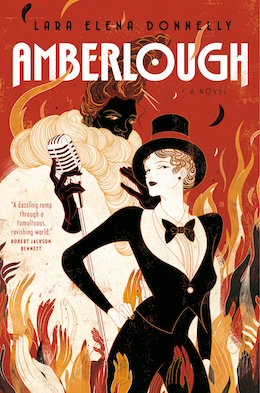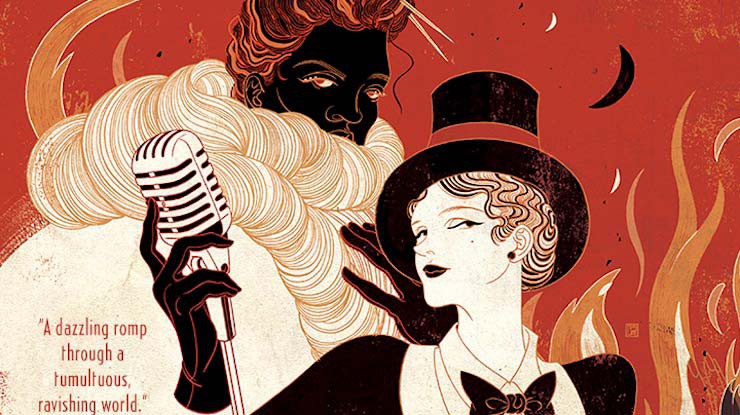I read Lara Elena Donnelly’s debut novel Amberlough in the throes of an insomniac night. It didn’t help me sleep: it’s a really compelling novel, with an intense sense of place and a glittering array of interesting characters.
It’s also a novel about the rise of a fascist regime where one of the main characters turns collaborator and efficiently facilitates the work of a fascist party, so it may not be everyone’s cup of tea. Yet, on the way to the iron fist of the fascist police state closing around the throats of its citizens, the novel provides an extraordinarily entertaining ride. It has an amazing voice, and its spy-thriller plot holds strong contemporary relevance—all the more so as it’s partly about how human weaknesses and human selfishness lead people to work for goals that are going to hurt them.
The titular Amberlough is a city in a federated nation, possibly the most outward-looking of the four states that comprise the country of Gedda. The technology and the culture seems rooted in a vision of the 1930s: cabaret theatre, drugs, corruption, flashy parties, cars and telegraphs and telephone switchboards and typing pools. But neither the culture of Amberlough nor of Gedda as a whole is a neat fit to any real-world nation of the 1930s: Amberlough seems to be a city that’s queer by default, in terms of much of its style and the substance of its social norms; while Gedda has an older form of marriage that allows for marriage between more than two individuals. The rise of the One State Party—the “Ospies,” a repressive, xenophobic and homophobic movement that also believes the place of woman is in the home—is at severe odds with Amberlough’s cosmopolitanism.
(The way in which Amberlough does and does not evoke Berlin of the late 1920s, and does and does not evoke modern American politics, is fascinating.)
Amberlough has three main characters. Cyril DePaul is a spy and a civil servant. (In terms of personality, he rather reminds me of Lord Peter Wimsey without anything like a moral core.) He shouldn’t have a long-term lover in the form of Aristide Makricosta, master of ceremonies at the Bumble Bee Cabaret, smuggler (of drugs and refugees and stolen objects), and mover-and-fixer. But he does, though neither Cyril nor Aristide are prepared to outright admit to anything so banal as love.
Cordelia Lehane is a dancer at the Bumble Bee Cabaret, a dealer of drugs, a determined survivor, and eventually caught up orbits of both Cyril and Aristide. I ended up liking Cordelia best: out of the three of them, it turns out that Cordelia finds—and holds—the line that she won’t cross first.
 But Cyril is a terrible person. An understandable sympathetic terrible person! But the most terribly tragically flawed person on the stage. The combination of his cowardice and his arrogance and his selfishness means we can see his long fall coming—and once I realised he was never going to find a line he wouldn’t cross, I started rooting for terrible things to happen to him. (I feel slightly bad about that.)
But Cyril is a terrible person. An understandable sympathetic terrible person! But the most terribly tragically flawed person on the stage. The combination of his cowardice and his arrogance and his selfishness means we can see his long fall coming—and once I realised he was never going to find a line he wouldn’t cross, I started rooting for terrible things to happen to him. (I feel slightly bad about that.)
The experience of reading about him and Aristide (whose drug smuggling business never quite comes into high relief) and Cordelia reminded me a bit of reading Ian McDonald’s Luna: New Moon, where compelling people whose largest guiding virtue is self-interest get themselves and poor innocent bystanders into all kinds of trouble. It also reminds me of Seth Dickinson’s The Traitor Baru Cormorant, in which the machinery of authoritarianism bends the narrative arc inevitably towards tragedy—even if, in Amberlough‘s case, the parties involved do not come to such a certainly doomed fate.
But it’s immensely compelling. Full of colour and verve and poor life decisions on the part of the characters—full of humanity. If this is how Donnelly is running out of the debut gate, I want to read many more novels from her pen.
Maybe some of them will even have less tragically flawed boys as their protagonists!
Let me close out this column by recommending to you Stephanie Burgis’s sweet lovely novelette “The Unladylike Education of Agatha Tremain.” It makes a more cheerful chaser to stories of interpersonal betrayal and fascist coups. The eponymous Agatha triumphs in the end over all the forces arrayed against her—and makes her own happy ending, with a very good friend.
Liz Bourke is a cranky queer person who reads books. She holds a Ph.D in Classics from Trinity College, Dublin. Find her at her blog. Or her Twitter. She supports the work of the Irish Refugee Council and the Abortion Rights Campaign.










